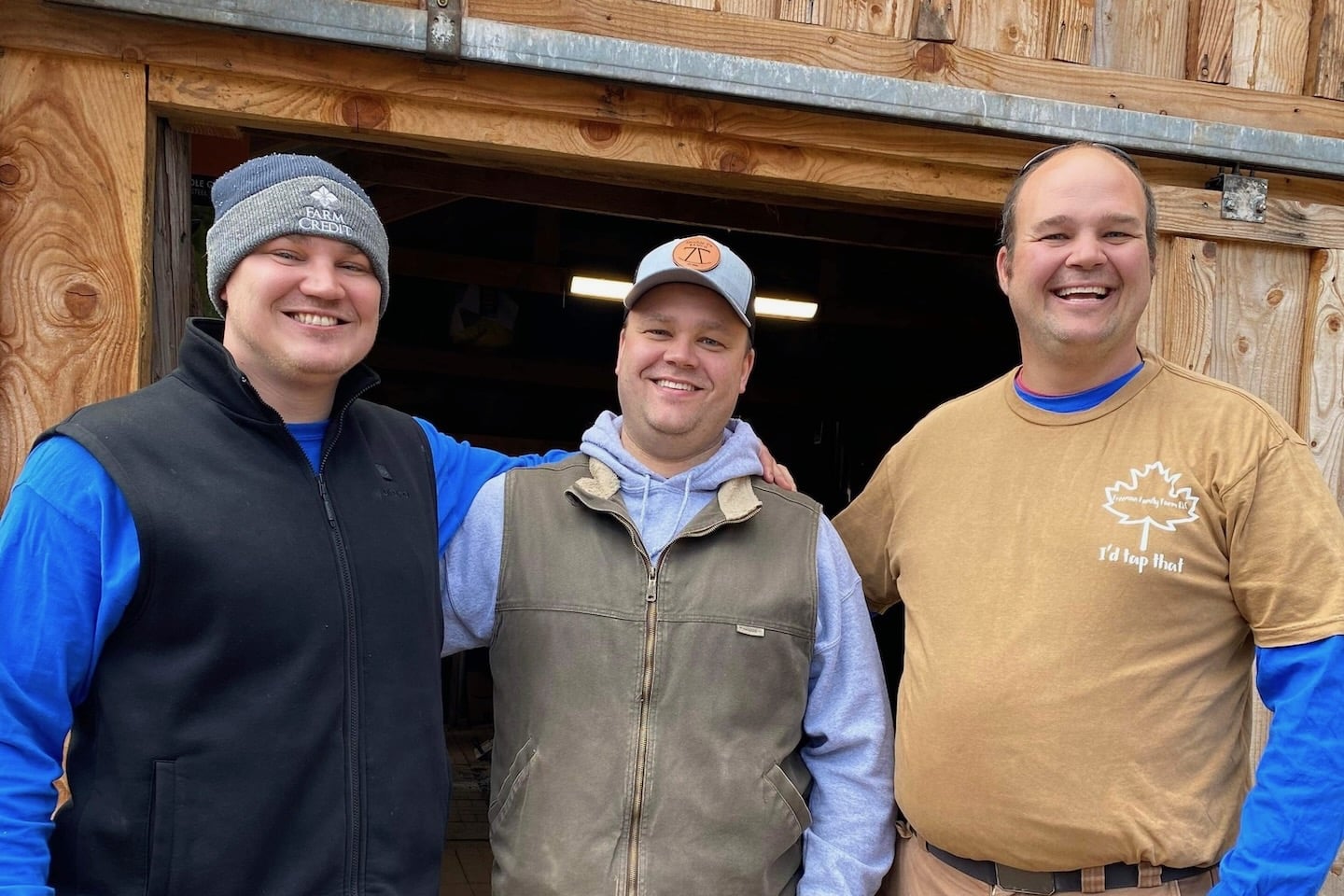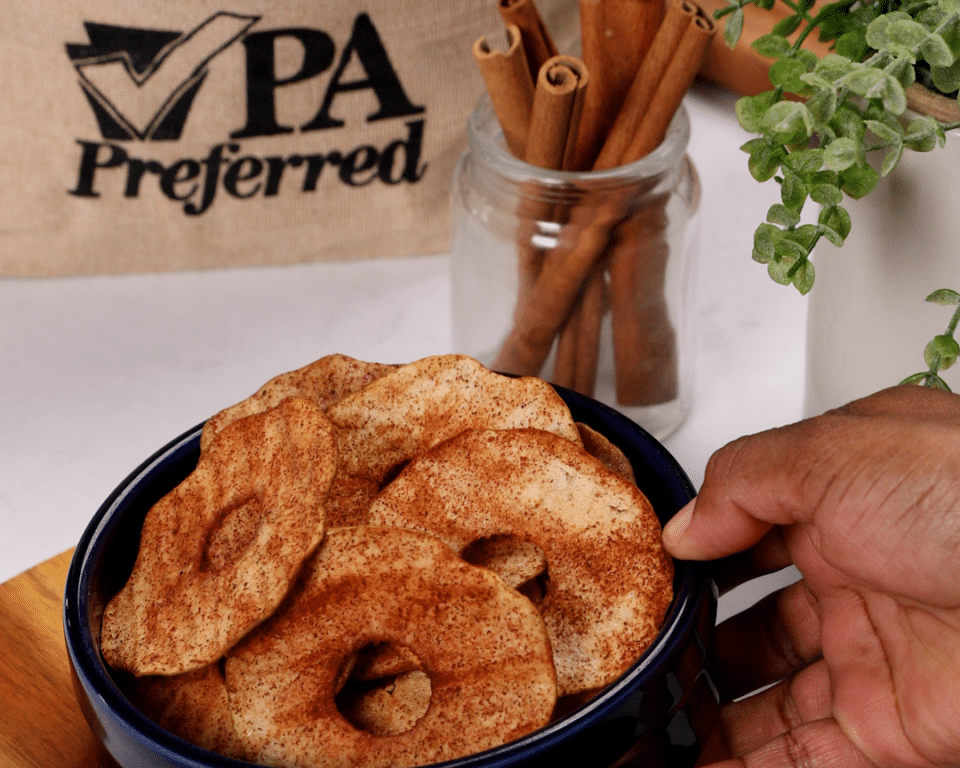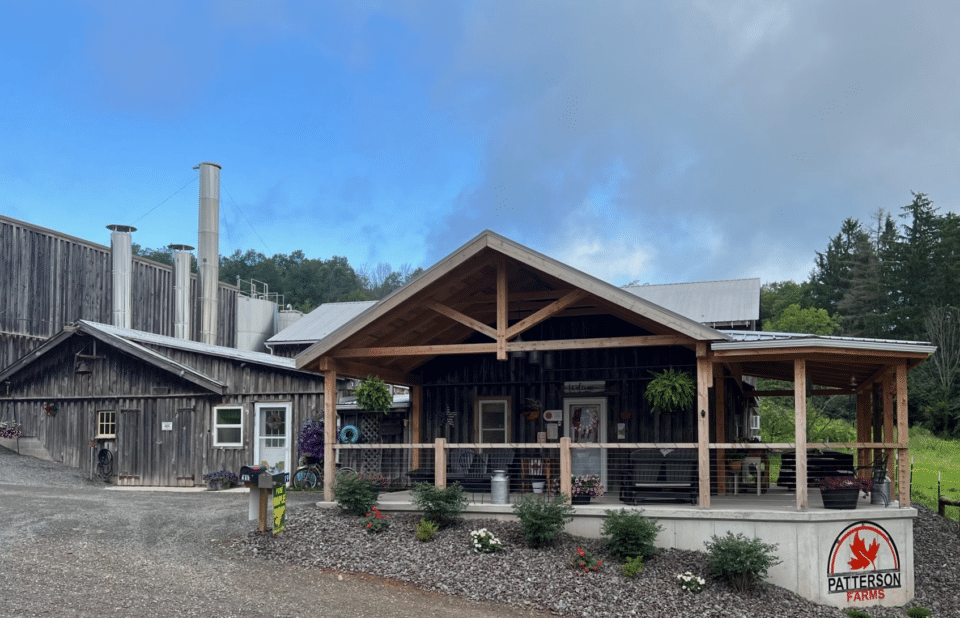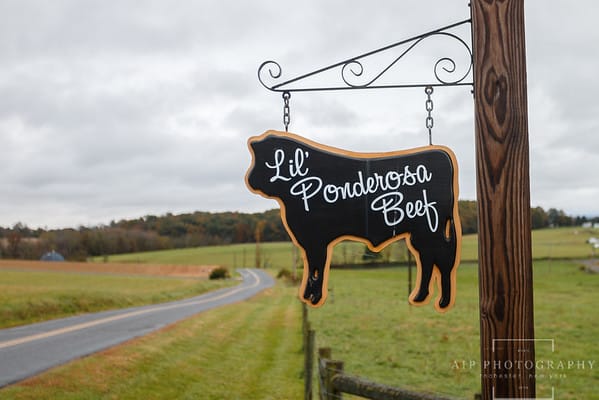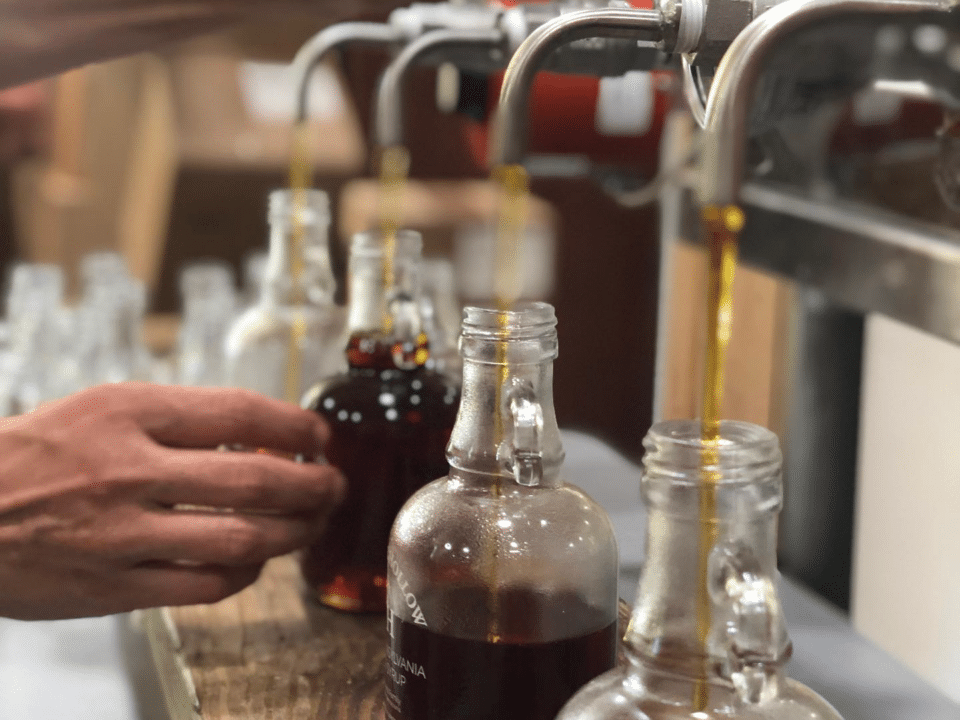For many veterans, reinvention follows service. It can be like starting all over, sometimes in entirely new fields and industries. Despite the challenges of changing direction, veterans are often uniquely well-suited for the demands, able to leap into the unknown, adjust to daily rigor and work through unexpected setbacks. The PA Preferred Homegrown By Heroes program supports veterans and active service members engaged in agriculture businesses through branding and promotion that sets them apart in a wide and competitive market. It helps PA residents locate veteran-owned businesses across the state and to support the resilient people behind them.
Homegrown By Heroes (HBH) is the country’s official farmer veteran branding program, administered by Farmer Veteran Coalition since Veterans Day, 2013. It includes over 2,000 members in all 50 states and Puerto Rico and receives support from the U.S. Department of Agriculture, Farm Credit and the American Farm Bureau. The PA Department of Agriculture has partnered with HBH and offers a special logo that merges the PA Preferred checkmark with the HBH logo for double the promotional impact. Membership in HBH is free and open to veterans of all military eras and those currently serving.
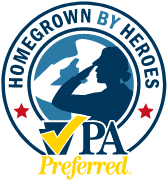
The steps to join are simple and free of cost:
- Become a member of the Farmer Veteran Coalition.
- Become HBH-Certified through the Farmer Veteran Coalition.
- Become a member of PA Preferred.

We spoke with PA Preferred HBH-Certified business owner, Mitchell Freeman of Freeman Family Farm, a 350-tap maple syrup producer in Potter County. He shared his experience with the HBH program, and a bit about what it’s like running a family-owned agribusiness in the Pennsylvania Wilds.
PA Eats: What brought your family into the maple syrup business?
Mitchell Freeman: As the youngest of three boys, I have fond memories of 2001 when I was six years old. My dad, always eager to find new hobbies for us, decided to revive a family tradition. Over a century ago, my great-grandparents made maple syrup on our farm, and my dad thought it would be exciting to bring that tradition back. We started modestly with 100 taps, a tarp, and a small evaporator. We quickly became passionate about it and have been expanding the business ever since. Sadly, my dad passed away unexpectedly in October 2021. My brothers and I are dedicated to continuing his legacy through our family maple syrup business.
What’s it like running a family business with so many family members?
Working with family comes with its own set of challenges. We each have unique personalities, objectives and priorities, which can sometimes be difficult to balance, and compromise is needed to achieve our end goal. However, at the end of the day, we collaborate well and take pride in achieving our common goal of continuing the family legacy. Our shared love for the final product, our maple syrup, makes the journey even sweeter.
Thank you for your service. Can you tell us about your military background?
My family has a rich military history. My paternal grandfather served in both the Korean and Vietnam wars. I also have two uncles who were career active-duty veterans in the Army and Air Force, an uncle that spent 20+ years in the Air Force Reserves, along with several cousins who have served. When I was deciding on my next steps after high school, I was offered an ROTC Scholarship at Penn State University. Following in my older brother Kyle’s footsteps, I joined the Army ROTC program there. Serving was always my goal, so accepting the scholarship to cover my college tuition was an easy decision.
During a visit to the PA Preferred booth at Ag Progress Days, I learned about the PA Preferred program and the Homegrown By Heroes program. These initiatives seemed like excellent ways for Pennsylvania-produced and veteran-produced products to be marketed. After returning home, I promptly filled out an application. A few weeks later, we received a welcome package. The process was straightforward, and we have enjoyed being part of the program. It has provided us with additional marketing opportunities and access to advertising venues we wouldn’t have had, otherwise.
What unique challenges might veterans and service members face in agriculture, farming or business management, in general?
One of the biggest challenges veterans might face is accessing capital and resources. While military pay is decent, it doesn’t always allow for significant savings, making it tough to start a business after retiring or leaving active duty. Additionally, the military doesn’t typically provide training in agriculture or business, focusing instead on military skills. This can leave veterans without essential skills needed to run a business.
Another potential challenge is dealing with physical or mental health issues. The demands of military service can take a toll both physically and mentally, with conditions like PTSD affecting many veterans. These health challenges can complicate the process of running a business.
Adapting to civilian life and navigating the bureaucracy and regulations in farming can also be difficult for those not accustomed to it. Finally, like all farmers, veteran farmers must contend with unpredictable factors, such as weather and market fluctuations, which add another layer of complexity to their work.
Can you give us an idea of the scope of your property and production?
Freeman Family Farm, LLC specializes in maple syrup production. Our dedicated sugarhouse is central to our operations, and we aim to reach 500 taps by 2025. Currently, we produce 60 gallons of pure Pennsylvania maple syrup annually, with plans to increase this output over time. To support our expansion, we upgraded from a 2’ x 6’ evaporator to a 2.5’ x 8’ evaporator for the 2025 season and plan to add vacuum to our maple lines to boost sap yield.
Our farm spans 158.6 acres, including 100 acres of tillable soil, 58 acres of wooded area, and 6 acres of pasture for our beef cows. The property features various buildings including a two-bay garage, a calf barn, a 40-stall tie-stall barn, a machine shed and a livestock building. Our primary residence is a charming pre-1900s farmhouse.
We currently operate with the help of my two older brothers, our wives, our mother and close friends. Our family has recently expanded with my brother and sister-in-law recently having a daughter, and my wife and I expecting our first child soon, however, it will be a few years before they can join the labor force.
Our equipment includes a UTV, a 92HP tractor with a loader, a 66HP skid steer, a 7 foot tiller tractor attachment and a brush hog. These tools enhance the efficiency of our diverse agricultural activities.
Our farm is contiguous with my mother’s family’s Glassmire Farm, adding another 300 acres for a total of about 500 contiguous acres. Our long-term plan is to continue expanding our maple syrup operation between both farms.
What led you to join the PA Preferred Homegrown By Heroes program?
I first learned about the Homegrown By Heroes program from a neighbor who is also a maple producer and a retired Army veteran from Coudersport, PA. He had earned the Homegrown By Heroes designation, which I found really inspiring. After doing some research, I met with representatives from the PA Preferred and Homegrown By Heroes programs at Ag Progress Days at Penn State. They provided me with more information and guided me through the application process. I thought it was a fantastic opportunity, so I signed up immediately. That was four years ago, and I have promoted this program among local agricultural veterans since.
It’s incredible to be part of such a small group, considering that veterans make up less than 1 percent of the population, and veteran farmers are an even smaller percentage. Being able to market our products under this designation is a great advantage.
What value does the PA Preferred Homegrown By Heroes program offer you?
I found the sign-up process for the Homegrown By Heroes program to be very straightforward. I filled out paperwork online and provided some documentation to verify my veteran status. It was very simple and easy to do.
Being part of this program has added significant value to our business. Marketing ourselves as a veteran-owned business resonates with many people, as most are eager to support veterans. The PA Preferred Homegrown By Heroes label enhances our word-of-mouth marketing and boosts our presence on social media. I take great pride in being a PA Preferred Homegrown By Heroes producer.
I highly recommend that any veteran farmer sign up for this program. Veterans have sacrificed a lot for their country, and this is a small way for the country and state to give back. The program is free and can only add value to their business. I see no downside to marketing a business as veteran-owned; it’s all positive.
Why do you think programs like PA Preferred Homegrown By Heroes, that acknowledge and support veterans and service members, are important?
Programs like PA Preferred Homegrown By Heroes that acknowledge and support veterans and service members are crucial. These individuals sacrifice so much for their country, including their bodies and time away from family and friends. Allowing them to label their agricultural products as veteran-produced helps them market their goods more effectively, which is the least we can do for those who have given so much for our nation.
We should continue to expand such programs at both the state and national levels. These initiatives not only help veterans market their products but also provide them with better opportunities to enter the agriculture industry. As the American farming population ages, bringing in hardworking veterans to this demanding field can ensure a bright future for American agriculture.
What has it been like running an agricultural business in the PA Wilds?
Running our farm and business in Pennsylvania is incredibly rewarding for me. Being born and raised in Coudersport, it’s fantastic to work within my community. In my full-time job as an Ag Lending Manager for Horizon Farm Credit, I provide loans to our agricultural community, and I also get to be a farmer myself. This dual role is a unique and fulfilling experience.
However, farming in Pennsylvania does come with its challenges. We are far from major markets and large populations, which increases transportation and fuel costs. These factors can make farming in a rural area like ours more difficult.
What exciting things do you see happening in the agriculture and farming industries, in general?
I believe the future of agriculture in Pennsylvania is very bright. Success will require innovation and diversification, but American farmers are among the hardest working people in the world, and I am confident they will continue to thrive.
One exciting development is the push to support young, beginning, small, veteran and minority farmers in the state. Programs like the Pennsylvania Veteran Farming Network encourage veterans to enter or return to farming. Additionally, organizations like Horizon Farm Credit offer grants and interest rate discounts to these groups, fostering the next generation of farmers. As the American farming population ages, it’s crucial for the state, government, and financial institutions to support young farmers entering the industry, creating great opportunities for them.
I’m also excited about the advancements in technology, such as AI and autonomous tractors. Seeing these innovations implemented in agriculture is thrilling and promises a bright future for the industry.
What are the vision and next steps for Freeman Farm?
We plan to expand our maple operation over the next few years by adding more taps and increasing production. We’re also looking to grow our beef operation. This year, we introduced beef cows to the farm for the first time, starting with two. While initially for personal consumption, we hope to eventually market our beef.
There’s always plenty of work on the farm, with numerous projects aimed at innovating and advancing our operations. Additionally, as we continue to grow our maple syrup business, we’re constantly seeking new markets and ways to diversify to sell our syrup.
To order Freeman Farm‘s maple syrup, send a message via its Facebook or Instagram to coordinate. Sizes include 100 ml, half pint, pint and quart, and drop-offs are often available in the Pittsburgh, Gettysburg and Wilkes-Barre areas in addition to its home turf of Potter County.
Learn more about the PA Preferred Homegrown by Heroes program on its website, and keep an eye out for the little yellow checkmark that ensures you’re buying local in Pennsylvania.
This series was created in collaboration with PA Preferred.

PA Preferred® is Pennsylvania’s statewide branding program that promotes locally grown and processed food and other agricultural products.
- Photos: Freeman Family Farm
